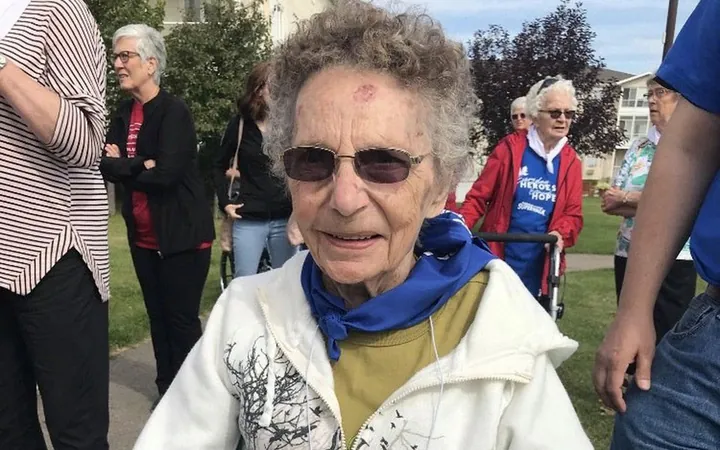
Raising Awareness for Parkinson's Disease: A Personal Journey and Call to Action
2025-04-04
Author: Michael
Introduction
As April unfolds, it brings not only the promise of spring but also a profound opportunity to raise awareness for Parkinson's disease globally. Known as Parkinson's Awareness Month, April's highlight, World Parkinson's Day on April 11, takes on a special significance for me as I remember my mother, Leona Modien, who passed away three years ago from this debilitating illness.
Understanding Parkinson's Disease
Parkinson's disease is a progressive neurodegenerative condition that devastates lives by gradually eroding the essence of those we cherish. This illness primarily targets the central nervous system, leading to a host of motor symptoms that include tremors, rigidity, and difficulties with balance and coordination. As the disease progresses, non-motor symptoms such as sleep disturbances, mood swings, and cognitive impairments start to surface, often complicating the lives of those affected.
The Prevalence of Parkinson's Disease
In Canada alone, a staggering 18 people receive a Parkinson's diagnosis every single day, amounting to over 550 new cases by the end of the month. The toll of this disease is staggering, with more than 110,000 individuals in Canada and millions globally grappling with its effects. Sadly, many cases remain unreported or undiagnosed, further complicating efforts to understand and combat this disease.
Challenges in Research
Research into Parkinson's is ongoing, yet the complexity of the disease poses numerous challenges. It is well-established that while aging brings about natural cell loss, individuals with Parkinson's suffer a more accelerated demise of dopamine-producing neurons. This disruption in dopamine levels is pivotal in the manifestation of both motor and non-motor symptoms.
Motor and Non-Motor Symptoms
Motor symptoms are often recognizable and include slowness of movement, tremors, and postural instability. However, the non-motor symptoms can be diverse and significant, encompassing a range of issues from cognitive decline and hallucinations to mood disorders and severe fatigue. Research indicates that depression is a common companion, affecting nearly half of those diagnosed at some point in their journey.
Living with Parkinson's Disease
Though there is currently no cure for Parkinson's, many individuals can still lead fulfilling and meaningful lives with the right combination of medical intervention and community support. Unfortunately, in the Southwest/Swift Current region of Saskatchewan, I discovered a lack of active support groups, unlike when my mother was a member of one about eight years ago. Parkinson Canada directed me to Jeannine Alain, the Chair of the Saskatoon Parkinson's disease support group, who has been actively involved since her diagnosis over a decade ago.
Advocacy and Community Support
Jeannine passionately advocates for physical activity, which studies support as beneficial in slowing disease progression. This guidance is made possible through collaborations with organizations like the Michael J. Fox Foundation, which has been instrumental in advancing Parkinson's research. Jeannine encourages those affected to visit resources such as www.pdavengers.com, stating that vocal advocacy and community involvement can lead to increased funding for research in the hope of eradicating this disease—similar to the victories against polio.
Light Up for Awareness
Moreover, April 11 also marks Blue Light Day, a perfect chance for everyone to show their solidarity by illuminating their homes or workplaces with blue lights. This simple act not only promotes awareness but fosters a sense of community and support for those affected by Parkinson's.
Conclusion
As we journey through Parkinson's Awareness Month this April, let us commit to educating ourselves and advocating for those who live with Parkinson's disease. Honor the stories and struggles of individuals fighting this illness, the caregivers who stand by their side, and cherish the memories of those we've lost. Together, through awareness and action, we can dream of a future where Parkinson's disease fades into the pages of history.









 Brasil (PT)
Brasil (PT)
 Canada (EN)
Canada (EN)
 Chile (ES)
Chile (ES)
 Česko (CS)
Česko (CS)
 대한민국 (KO)
대한민국 (KO)
 España (ES)
España (ES)
 France (FR)
France (FR)
 Hong Kong (EN)
Hong Kong (EN)
 Italia (IT)
Italia (IT)
 日本 (JA)
日本 (JA)
 Magyarország (HU)
Magyarország (HU)
 Norge (NO)
Norge (NO)
 Polska (PL)
Polska (PL)
 Schweiz (DE)
Schweiz (DE)
 Singapore (EN)
Singapore (EN)
 Sverige (SV)
Sverige (SV)
 Suomi (FI)
Suomi (FI)
 Türkiye (TR)
Türkiye (TR)
 الإمارات العربية المتحدة (AR)
الإمارات العربية المتحدة (AR)